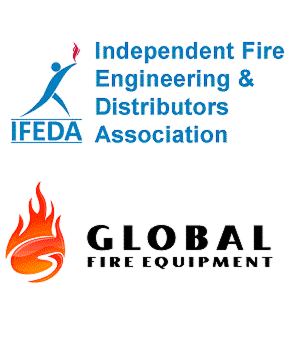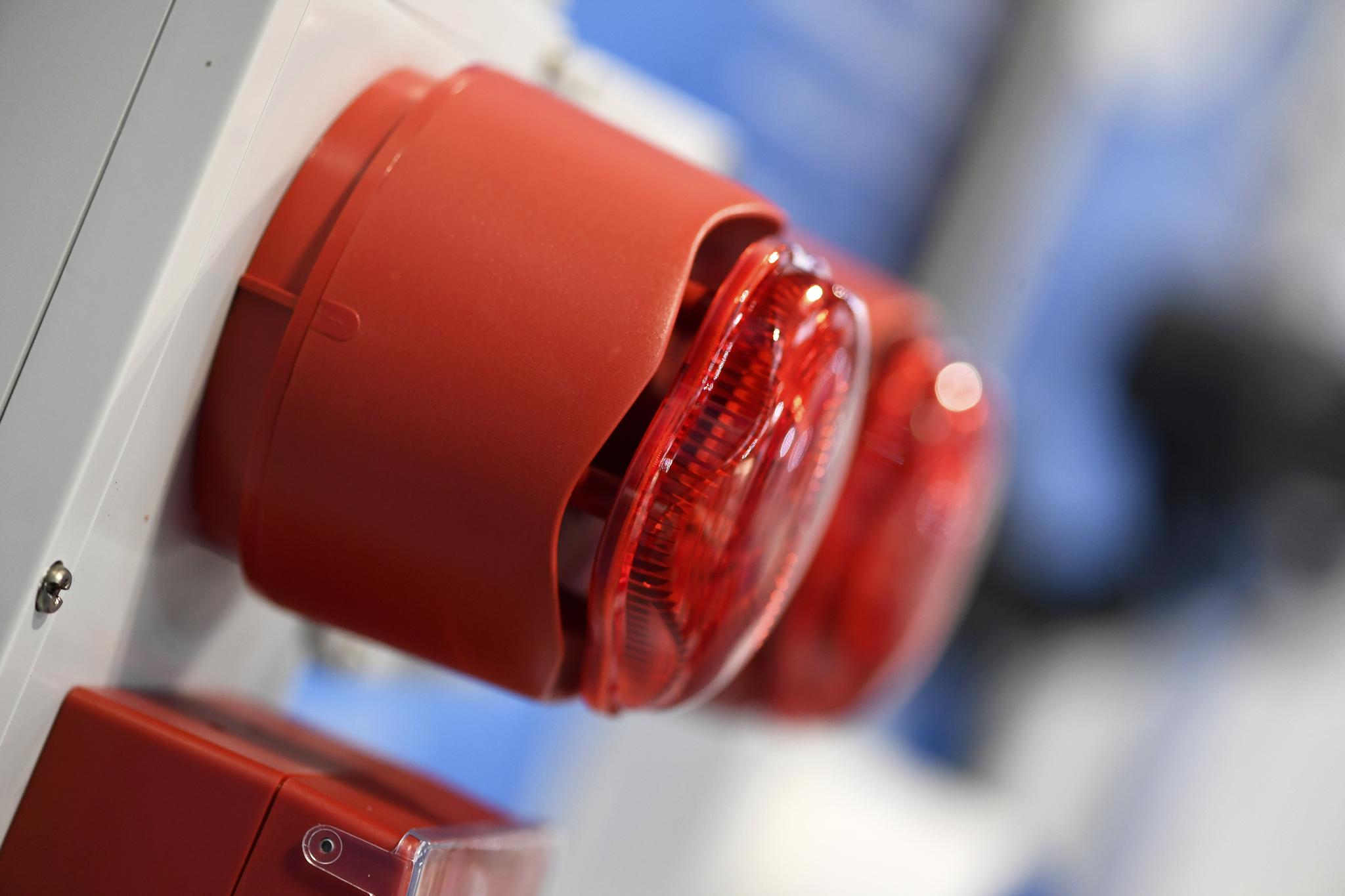Fighting Fires with Fire
)
In this exclusive interview for the Nineteen Group, Western Business Media’s CEO  Mark Sennett chats with Paul Pope (Group business development director at Global Fire Equipment and also a director of the Fire Industry Association) and Mike Tobin (chairperson of Independent Fire Engineering and Distributors Association) about the current ‘State of the Nation’ in the UK’s fire industry. The impact of COVID-19, the overriding need for competency and the likely effects of Brexit are very much under the microscope.
Mark Sennett chats with Paul Pope (Group business development director at Global Fire Equipment and also a director of the Fire Industry Association) and Mike Tobin (chairperson of Independent Fire Engineering and Distributors Association) about the current ‘State of the Nation’ in the UK’s fire industry. The impact of COVID-19, the overriding need for competency and the likely effects of Brexit are very much under the microscope.
Mark Sennett: What have been the most significant impacts of COVID-19 on the fire sector here in the UK?
Paul Pope: By far the most hard-hitting impact on the UK fire industry is the financial repercussions for businesses resulting from the almost complete closure of the world’s economy.
The second most significant impact relates to the Fire Industry Association (FIA) getting clarification from the Government that fire system engineers qualify for key worker status, thereby allowing them to undertake maintenance on critical areas of the nation’s infrastructure, such as the temporary Nightingale Hospitals.
We must recognise that people in many sectors, the fire sector among them, have been putting their lives at risk throughout this pandemic. By no means has our sector been immune to what’s been happening.
Mike Tobin: I agree with Paul. Initially, the financial impact and the fact that everything in our industry just seemed to grind to a halt over a 24-hour period was most certainly an issue. We had to wait for clarity from the Government on the next steps.
In terms of the key worker status, I’m aware that we had members being stopped by the police and we had to issue stickers for our members so that they had proof they were classed as key workers.
Personal Protective Equipment (PPE) has also been a significant sticking point, I went from being the chairperson of IFEDA (Independent Fire Engineering & Distributors Association) to helping to source PPE for members because it was so difficult for them to do so.
Mark Sennett: What do you think the long-term impacts of COVID-19 will be on the fire sector?
Paul Pope: The focus will be on the financial recovery of businesses, and supporting those individuals who’ve met with financial hardship. What happens in the longer term will depend on how quickly things can get back to the new normal. The industry must remain resolute and keep the positive momentum going until we’re really sure we’re out of danger.
Mike Tobin: Paul makes a very good point. Speaking from IFEDA’s perspective, we’re trying to drive a better-quality service and a better industry. I’m particularly concerned about the risk that if a recession hits, people will tend to go with the cheapest price which can then drive down quality. The financial impact of the pandemic is horrendous, and we could see the ramifications for many years to come.
Mark Sennett: Can you explain precisely how the COVID-19 pandemic has affected your normal day-to-day business activities?
Paul Pope: Maintaining an international systems manufacturing business has been quite a challenge. We are heavily reliant on logistics - making sure that products are in the right place at the right time. We’ve focused on keeping our staff safe and implementing common sense risk management practices across the business.
We’re lucky that our manufacturing plant is in a part of Europe where there haven’t been that many COVID-19 cases, so there hasn’t been too much disruption to production. The business has continued to operate at 100% capacity. Due to airlines being grounded and the cost of freight rising exponentially, our main challenge was the logistics of shipping of our products worldwide.
Mark Sennett: When it comes to improved competencies in the fire sector, why do you believe there needs to be an increased focus on skills?
Paul Pope: A Competency Steering Group was formed to tackle some of the shortfalls in the construction industry and address the findings outlined in Dame Judith’s Hackitt Report. Her report clearly identifies the need for professional improvement.
Right across the fire sector, companies and individuals alike will need to provide proof of their competency.
It will almost certainly be recommended that those working in the industry should achieve a minimum Level 3 qualification relevant to their area of expertise. Individuals and businesses alike have to work to prove their competency, raising the bar for both professionalism and competency.
Going back to the issue of pricing, it must also be recognised that price can drive down competencies. No-one can do a decent job if the it’s being completed on the cheap. Pricing is most definitely an issue for the industry to be aware of and act upon.
Mike Tobin: I’m passionate about driving forward with training and competency across our industry. There has been a good deal of online training of late and while training in any format is better than none, I feel there’s a need for people to actually do the job. Reading from an instruction manual is all well and good, but the hands-on performing of tasks is key.
Paul Pope: I agree wholeheartedly with Mike’s comments. Hands-on experience at the coalface, knowing what to do and being trained by somebody who is competent in the field is absolutely essential.
The Government is seeking proof of competency in terms of qualifications backed by OFQUAL (Office of Qualifications and Examinations Regulation), Qualifications Wales and Qualification Northern Ireland. While these may represent the minimum levels of competency, I think if individuals can log all of their experience alongside those qualifications, and provide evidence of having been trained by top engineers, then that’s a significant step forward for our industry.
Mark Sennett: With all of that in mind, in your view what’s the most practical way in which to broadly and successfully upskill the sector?
Paul Pope: I would advise individuals to verify any training they undertake to determine its relevance to the sector. People are investing their time and hard-earned money in training so deriving value for money from the training is vital, particularly so at the present time.
Currently, some engineers are furloughed or they’re in isolation, but they can continue with their professional development within the Government’s own rules. It’s a great time for completing expertise training not related to onsite work. When back on the road, engineers can then follow this up with the hands-on instruction.
Mike Tobin: In an ideal world, I’d like to see training centres across the UK where practitioners can go back to the original ways of learning their trade before going out on-site. Given the financial impact of COVID-19, that’s unfortunately not realistic or practical at the moment.
I think we’ve been guilty of being too slow off the mark with training. It has taken Dame Judith Hackitt shouting at the industry for this issue to be looked at with any great degree of seriousness.
Mark Sennett: What do you believe will be the biggest impact of Brexit when it comes to the fire sector?
Paul Pope: The key issue is whether, on 1st January 2021, we leave the EU with or without a deal, but whatever the outcome the whole landscape will change. With a deal, we first need to see the new trading arrangements. Without a deal, there will be immediate and significant implications for cross-border trade and in terms of product approvals processes.
On the latter, there have been calls for a new product mark for the UK, but there’s no way of achieving this by next January. There’s no advice on the relevant government websites to say who’s responsible for this process, how we’re going to do it and what the cost might be to industry to implement it all.
Frankly, there are so many unanswered questions that the situation is something of a minefield.
Mike Tobin: My heart goes out to the manufacturers, to be honest. This couldn’t be a more difficult time for them with COVID-19 in play and Brexit looming ever closer on the horizon, as well as the potential for a global recession. The wheels will keep turning for fire extinguisher engineers and fire alarm engineers, for example, because such systems are a mandatory requirement, but those wheels will probably turn a lot slower than usual.
Mark Sennett: How much worse might the situation be if the UK does end up leaving the EU without a deal having been struck?
Paul Pope: Once the transition period ends on Thursday 31 December, the UK will be designated as a third country by the EU and we’ll no longer be a member trading partner. There are several immediate implications of this situation. First, tariffs will apply to most UK exports. As yet, we don’t know what they are and what they will be.
Second, all UK exports will have to undergo new customs procedures while regulated goods, such as many of those we manufacture within the fire safety sector, will need to have additional licences in order to pass through additional procedures. The net result is going to be significant delay and significant increases in costs while we wait for a new deal to be agreed, which. could take some time. For example, a simple thing like getting your Economic Operator Registration and Identification number (you cannot trade without one) will take time, especially if thousands of companies are all trying to get one at the same time.
Recently, I put forward a document (published by the FIA at https://www.fia.uk.com/uploads/assets/ede09597-7ddc-48a3-a55004a97b13d921/FIA-BREXIT-Preparation-Checklist.pdf) relating to this subject, including international trade preparation checklists. Without clear guidance from the Government, every business now has to have in place its own back-up plans.
Mike Tobin: If we’re being realistic, we’ve seen what can happen when the working relationships break down between ourselves and the EU. Remember those strikes many years ago and the supply and demand issues we subsequently faced? I can imagine that happening again.
Mark Sennett: Finally, Paul, as an EU-based manufacturer, how is Global Fire Equipment going to support its UK customers going forward?
Paul Pope: The UK is a very important market for us. We’re investing in partnerships right now and we’re very much here for the long-term, regardless of the final Brexit outcome.
Only recently, our UK partners moved into larger premises which allows us to hold more stock in the UK so that we can avoid the border delays. We’re holding critical parts for real-time maintenance and repairs. Product support is important for the ongoing provision of UK-based training schemes.
Being based in the EU, the European side of the business is fairly secure in terms of certifications and logistics in relation to moving product around. It’s fair to say that the UK is more vulnerable for everybody right now, but we’ll be doing everything we can to support our UK customers.


.png)
.png)
.png)
.png)

